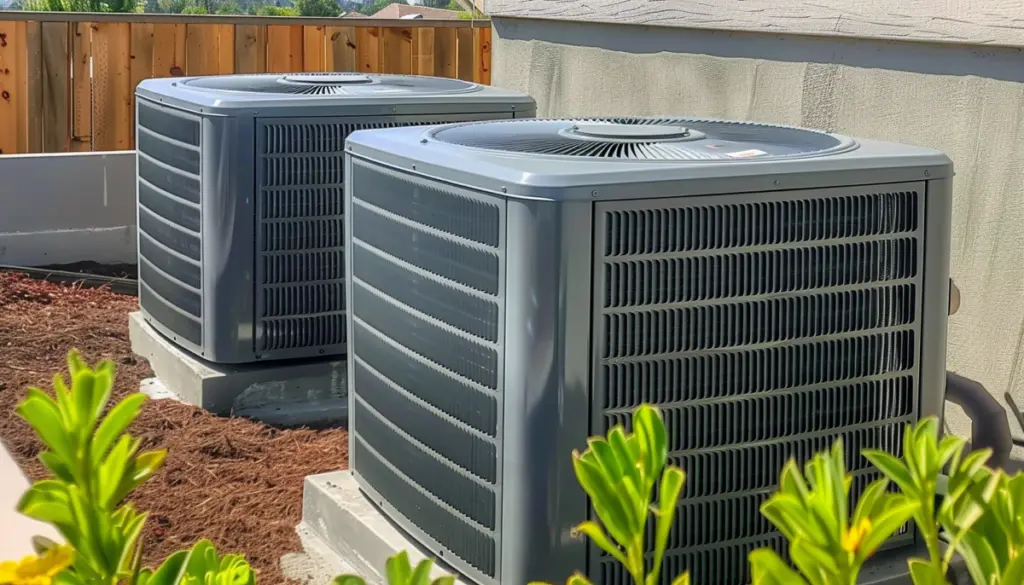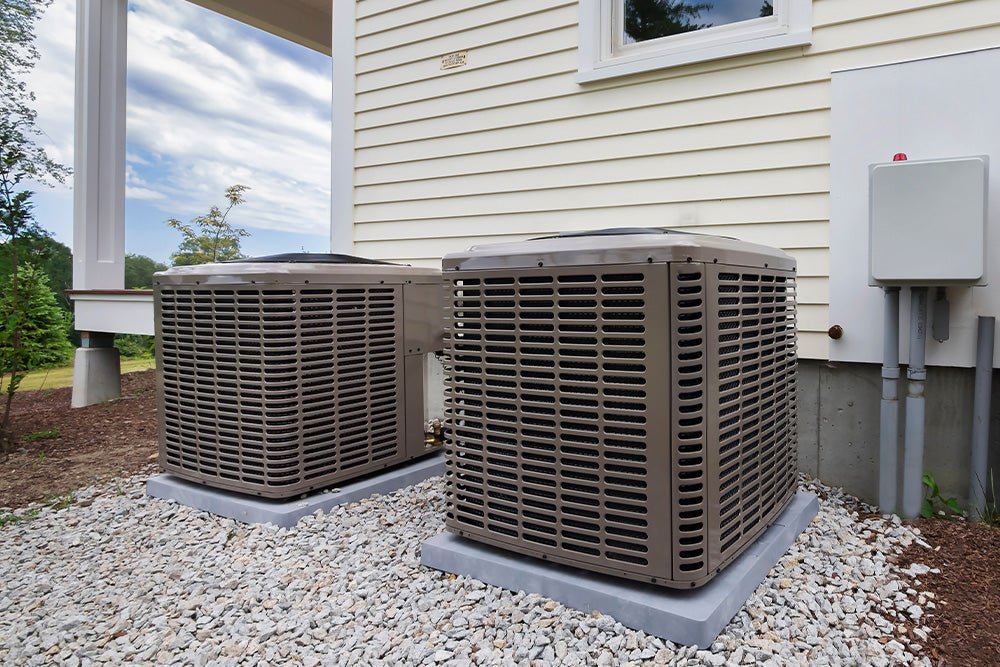See how HVAC experts provide affordable comfort solutions for businesses
Discovering the Essential Parts of a Reliable HVAC System
An efficient HVAC system is improved a number of crucial parts that work in consistency. Each part, from the thermostat to the ductwork, plays an essential role in keeping comfort and energy performance. Recognizing these elements is critical for optimizing efficiency and improving indoor air quality. As one takes a look at these elements, the intricate connections in between them disclose insights right into enhancing overall system performance. What specific factors contribute most to this performance?
The Role of the Thermostat in Cooling And Heating Efficiency
Often neglected, the thermostat plays a vital role in the efficiency of Cooling and heating systems. This tiny gadget acts as the main control center, controling temperature settings and making certain suitable comfort within an area. By precisely picking up the ambient temperature level, the thermostat interacts with the air flow, heating, and air conditioning systems to keep the wanted environment
A reliable thermostat lessens energy usage by turning on the a/c system only when needed, consequently stopping excessive heating or cooling. Modern smart and programmable thermostats boost this effectiveness additionally by permitting individuals to set schedules and from another location adjust settings, adjusting to daily regimens.
Furthermore, the placement of the thermostat is essential; inappropriate area can lead to imprecise temperature level analyses, resulting in inefficient procedure. In general, a well-functioning thermostat not just improves comfort however likewise contributes significantly to energy financial savings and the durability of the HVAC system.
Comprehending the Value of Air Filters
Air filters serve an important feature in HVAC systems by ensuring that the air distributing within an area continues to be clean and healthy and balanced. These filters catch dirt, allergens, and various other pollutants, preventing them from being recirculated throughout the setting. By capturing these bits, air filters add to improved indoor air top quality, which can greatly profit occupants' health and wellness, especially those with allergic reactions or respiratory problems.
Furthermore, preserving tidy air filters improves the effectiveness of a/c systems. Blocked filters can restrict air flow, creating the system to work harder to maintain wanted temperatures, resulting in raised energy consumption and greater utility expenses. Regularly replacing or cleaning filters is an essential maintenance action that can lengthen the lifespan of a/c tools. Inevitably, recognizing the value of air filters allows homeowners and structure managers to take aggressive steps to assure a well-functioning, effective HVAC system that promotes a safe and comfy interior environment.

The Capability of the Heater and Heatpump
Furnaces and warmth pumps are essential elements of heating and cooling systems, in charge of supplying warmth during cooler months. Heating systems run by heating air via burning or electrical resistance, after that dispersing it throughout the home via air ducts. They typically offer fast heating and can be sustained by natural gas, electrical power, or oil, depending upon the system kind.
Conversely, heat pumps move warmth instead of generate it. They extract warm from the outdoors air or ground, also in reduced temperature levels, and transfer it indoors. HVAC experts. This twin performance permits warm pumps to likewise give cooling in warmer months, making them functional choices for year-round environment control
Both systems require correct maintenance to assure performance and durability. While heaters excel in severe chilly, heatpump can be beneficial in moderate environments. Comprehending their distinct functionalities help home owners in picking the most ideal option for their home heating needs.
Exploring the A/c Device
The cooling unit is a vital element of HVAC systems, available in various types to fit different demands. Recognizing the performance ratings of these systems is vital for making notified choices regarding power intake and price. This area will explore the varied kinds redirected here of air conditioning system and make clear how efficiency ratings influence efficiency.
Sorts Of Air Conditioners
While different aspects influence the selection of a/c Read More Here systems, understanding the different types offered is critical for homeowners and building supervisors alike. Central air conditioning conditioners are developed to cool whole homes or structures, utilizing a network of air ducts for air movement. Window units provide an even more local remedy, perfect for single areas or small rooms. Portable air conditioning system supply flexibility, enabling users to move the device as needed. Ductless mini-split systems are another choice, incorporating the efficiency of central systems with the ease of zoning, as they require no ductwork. Finally, geothermal systems harness the planet's temperature for energy-efficient air conditioning. Each type comes with distinctive advantages, making informed choices crucial for effective climate control.

Effectiveness Ratings Clarified
Comprehending efficiency rankings is necessary for selecting the right air conditioning unit, as these metrics supply insight right into the system's efficiency and power intake. One of the most typical ranking for a/c is the Seasonal Energy Effectiveness Proportion (SEER), which measures the cooling outcome during a typical air conditioning season divided by the complete electrical energy input. A higher SEER shows much better performance. In addition, the Power Efficiency Ratio (EER) is used for gauging performance under specific conditions. An additional important metric is the Energy Celebrity certification, which signifies that an unit meets stringent energy effectiveness standards. By reviewing these ratings, customers can make educated selections that not just maximize convenience but likewise decrease power costs and environmental impact.
The Importance of Ductwork and Airflow
Efficient ductwork design and airflow administration play critical functions in the general effectiveness and efficiency of cooling and heating systems. Proper ductwork warranties that conditioned air is dispersed uniformly throughout a space, decreasing temperature fluctuations and boosting comfort. Properly designed ducts minimize resistance to airflow, decreasing the work on a/c tools and inevitably lowering power usage.
Airflow administration involves tactically placing vents and signs up to improve the flow of air. This prevents common issues such as cool or warm places, which can happen when air flow is blocked or inadequately balanced. Additionally, the best read here air duct products and insulation can additionally enhance efficiency by decreasing heat loss or gain throughout air transit.
An efficient ductwork system not just adds to power cost savings but can likewise lengthen the life-span of heating and cooling tools by reducing unnecessary stress (HVAC experts). Understanding the importance of ductwork and air movement is important for achieving peak Heating and cooling system performance.
Routine Upkeep Practices to Boost Performance
Routine upkeep methods are necessary for guaranteeing peak performance of heating and cooling systems. These practices include regular assessments, cleansing, and needed repair work to keep the system running effectively. Routinely transforming air filters is crucial, as stopped up filters can obstruct airflow and decrease efficiency. In enhancement, specialists ought to inspect and tidy evaporator and condenser coils to stop overheating and power wastefulness.
Annual professional examinations are additionally recommended, as skilled professionals can identify potential issues before they rise. Lubricating moving components decreases damage, adding to a much longer life expectancy for the system. Furthermore, ensuring that the thermostat functions correctly help in preserving ideal temperature control.

Frequently Asked Concerns
Just how Typically Should I Change My Thermostat?
Thermostats ought to typically be replaced every 5 to one decade, relying on usage and technology innovations. Routine checks are recommended to assure peak performance, especially if experiencing irregular temperature level control or boosted power costs.
What Dimension Air Filter Is Finest for My Heating And Cooling System?
The finest dimension air filter for an a/c system differs by unit style. Usually, it's crucial to consult the proprietor's handbook or examine the existing filter measurements to guarantee peak efficiency and air high quality.
Can I Mount a Heatpump Myself?
Mounting a warm pump separately is feasible for proficient people, but it calls for knowledge of electric systems and local codes. Working with a specialist is suggested to guarantee appropriate installation and optimal system performance.
Just how Do I Know if My Ductwork Is Effective?
To figure out ductwork effectiveness, one ought to check for leakages, step airflow at vents, examine insulation quality, and evaluate temperature distinctions in between supply and return air ducts. Professional assessments can provide complete insights right into overall performance.
What Are Indications My A/c Needs Immediate Maintenance?
Indicators that a heating and cooling system needs immediate maintenance include uncommon sounds, irregular temperature levels, raised energy bills, undesirable odors, and regular biking. Resolving these concerns without delay can avoid further damage and guarantee height system performance.
Air filters offer an essential feature in Heating and cooling systems by ensuring that the air circulating within an area continues to be tidy and healthy. In addition, maintaining tidy air filters boosts the performance of A/c systems. Ductless mini-split systems are one more alternative, integrating the effectiveness of central systems with the ease of zoning, as they require no ductwork. Comprehending efficiency scores is essential for selecting the ideal air conditioning unit, as these metrics give insight into the system's efficiency and energy intake. The best size air filter for a HVAC system differs by device style.